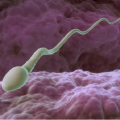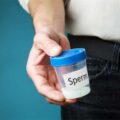Approximately 40–50% of all cases of infertility is due to “male factor” infertility and as many as 2% of all men will exhibit suboptimal sperm parameters. It may be one or a combination of low sperm concentration, poor sperm motility, or abnormal morphology. According to Healthline, one of the most common causes of watery semen is low sperm count. This is also known as oligospermia. If you have low sperm count, it means your semen contains fewer sperm than normal. A sperm count of fewer than 15 million sperm per milliliter of semen is considered below normal.
Some causes of oligospermia include:
- Varicocele. A varicocele is a swelling of veins from the testicles in the scrotum. It’s a major, but treatable, cause of male infertility.
- Infection. Examples include a sexually transmitted disease such as gonorrhea or another kind of infection that causes inflammation of a reproductive organ, such as epididymitis.
- Tumors. Malignant and benign tumors in the testicles may affect sperm production.
- Hormone imbalances. Hormones produced in the testicles, pituitary gland, and hypothalamus are all necessary to produce healthy sperm counts. Changes in any of these hormones could affect sperm production.
According to a study published in the Nigerian Journal of Clinical Practice there is a high rate of abnormal semen quality of male partners of infertile couple. Male sperm is normally thick and white in color. However, certain medical conditions and lifestyle factors can change the color and consistency of sperm. Watery sperm does not have that thick semen texture. Instead, it is more ‘liquidy’. This condition indicates low sperm count and possible infertility issues.
Male fertility depends on your body making normal sperm and delivering them. The sperm go into the female partner’s vagina. The sperm travel through her cervix into her uterus to her fallopian tubes. There, if a sperm and egg meet, fertilization happens.
How to Make Sperm Thicker and Stronger
There are several ways to increase your sperm health and enhance your chances of making babies. According to Web MD, incorporating home remedies and lifestyle changes is the way to go if you want to make your sperm thicker, healthier and stronger:
Eating the Right Diet: Your diet may play a big role in your fertility health. Some studies suggest that certain foods contribute to a decrease in sperm count, including:
- Processed meats like hot dogs and salami. The reason behind the relationship between processed meats and sperm count isn’t yet clear, but preliminary studies show a connection.
- Foods with trans fats. Trans fats lead to heart disease, but some studies show they also lead to reduced sperm count. Luckily, the U.S. Food and Drug Administration banned most trans fats in the U.S., making them easier to avoid.
- Soy products. Soy has phytoestrogen, a compound that is similar to the hormone estrogen. Consuming too much of it can lead to lower sperm count.
- High-fat dairy products like whole milk. Researchers aren’t entirely sure why consuming high-fat dairy products leads to lower sperm count. One theory is that it is due to steroids given to cows.
- Foods with pesticides on them. Some pesticides act as xenoestrogens. Similar to phytoestrogens, they mimic the hormone estrogen in your body. This can lower your sperm count. Wash your produce before eating to reduce pesticide exposure.
- Foods packaged with bisphenol-A (BPA). BPA also contains xenoestrogens.
Foods that can help to improve sperm count and motility include:
- Fish. Doctors hypothesize that the high content of omega-3 fatty acids in fish improves sperm count.
- Fruits and vegetables. Fresh fruits and vegetables have higher concentrations of vitamins and antioxidants — which can protect your cells from damage — that may improve sperm count.
- Walnuts. One study found that consuming 18 walnuts a day for 12 weeks improved sperm count.
Taking The Right Supplements: The following supplements may improve sperm count and male fertility issues:
- D-aspartic acid (D-AA). Experts believe this amino acid is related to low sperm count because men with fertility issues have lower levels of it. Studies show that taking this acid as a supplement can raise testosterone levels. If hormonal issues are the cause of your low sperm count and motility problems, this supplement may help.
- Vitamin C. This powerful antioxidant protects your body’s cells from oxidative stress, which leads to deterioration of cells. Oxidative stress can contribute to anything from heart disease to cancer. Studies show it may also lead to infertility. One study showed that taking 2,000 milligrams of vitamin C per day for two months increased sperm motility by over 90% and doubled sperm count. It also decreased the amount of damaged sperm by more than half.
- Vitamin D. Studies show that people deficient in vitamin D are more likely than others to have low testosterone levels, which could lead to lower sperm count. One study showed that taking vitamin D for a year increased testosterone levels significantly.
- Fenugreek. One study showed that taking Testofen — a supplement made from fenugreek extract — improved testosterone levels, sexual function, and sexual frequency. This is another supplement that may help hormonally related low sperm count and motility issues.
- Zinc. Studies show that zinc supplementation increases both sperm count and testosterone levels, but only in those already deficient in it. However, too much zinc in semen may damage sperm, so further study is needed to determine the exact dosage and application for this use.
- Ashwagandha. Supplementing with the herb ashwagandha daily for three months led to a more than 150% increase in sperm count in one study. The same study also showed a more than 50% increase in motility.
- Maca root. One preliminary study showed that taking maca root powder daily for four months improved both motility and sperm count. However, more study is needed.
- Coenzyme Q10. Early studies show that using this supplement increased sperm counts by about 17% and motility by over 50%. However, more study is needed to determine if this supplement leads to more live births or simply better sperm counts.
Quiting Smoking: Smoking causes reproductive health issues in both men and women. Smoking is related not only to lower sperm count, but also to damaged DNA in sperm. This can lead to miscarriages and other reproductive issues. Sperm takes about three months to mature. For that reason, experts recommend quitting smoking at least three months before you try to conceive.
Quitting smoking immediately improves sperm quality. After three months, the chances of increased sperm count and motility are even greater.
When to See a Doctor
You should call your doctor if you have been having unprotected sex for a year and no pregnancy has occurred yet. You may want to call your doctor sooner if you have:
- Issues with sexual function
- Pain or swelling in the groin area
- A lump in the groin or testes
- A history of past reproductive health issues
- A recent genital surgery
Depending on the cause of your low sperm count, your doctor may recommend any of the following:
- Surgery for blocked ejaculatory ducts
- Medication for erectile dysfunction
- Counseling to help with sexual dysfunction
- Hormonal treatment
Frequently Asked Questions About Male Infertility
What health problems can cause male infertility?
Many health problems–from kidney disease to testicular cancer–can result in male infertility. “Whole-body” health problems and metabolic disorders, and ordinary fevers and infections can harm sperm growth. Diseases passed through sex can lead to blocks and scars in the reproductive tract.
Genetic health problems, such as cystic fibrosis can cause the vas deferens or seminal vesicles to be absent leading to no sperm in the semen. Many illnesses can cause infertility. It’s important that you and your partner tell your family and personal health histories to your health care provider.
Can cigarette smoke affect sperm?
Yes. Research shows that routine smoking affects sperm in many ways. It causes sperm cells to be smaller and slower. It harms their DNA. Smoking can also affect the seminal fluid ejaculated with sperm.
Can using steroids for body building cause infertility?
Yes. Steroids taken by mouth or shot can cause your body to stop making the hormones needed to make sperm.
Do abnormal semen analyses or sperm lead to children with birth defects?
Not necessarily. For most couples seeking fertility treatment, the risk of conceiving a child with a birth defect is the same as for the general population. Some problems (chiefly genetic problems) that cause infertility may also cause a greater risk of conceiving a child with birth defects. So couples need thorough exams and advice before beginning some forms of ARTs.
What’s the main thing I should know about male infertility?
Infertility is not you or your partner’s fault. The American Society of Reproductive Medicine (ASRM) estimates that in about a third of infertility cases it is due to the male. Another third is the female. In the last third of infertile couples, the problem is caused by either a combination of reasons, or, in 20 out of 100 cases, it can’t be explained.
In men, few or no sperm is the biggest problem. In women, the common problems are ovulation problems and blocked tubes. But today, technology and surgical tools exist to address many of these problems.
What are assisted reproductive techniques (ARTs)?
ARTs are high-tech methods to join sperm and egg when sex can’t do it. Your health care provider may suggest one or more ARTs if pregnancy doesn’t happen even though sperm are in your semen.
If I have obstruction causing no sperm in the ejaculate (obstructive azoospermia), when should my partner and I consider sperm retrieval with an assisted reproductive technique (ART) rather than surgery?
Often, microsurgical correction removes the need for ART. However, if that is not successful, sperm can be removed from the testicle or epididymis and injected into your partner’s eggs using ICSI, even after surgery to fix the blockage. ICSI is used because the number of motile sperm is often small and they don’t move well.
There are many methods for retrieving sperm cells. The choice will be up to you and your urologist. Sperm retrieval can be done before or at the same time as your partner’s egg retrieval and IVF.
Many reproductive centers like to use “fresh” sperm retrieved on the same day as egg retrieval. Others favor sperm harvested earlier and frozen. Sperm can be retrieved by needle aspiration or microsurgery.
If I have a varicocele, when should my partner and I consider an assisted reproductive technique (ART) rather than surgery?
If you and your partner both have fertility problems and she can’t get pregnant naturally, then one of the ARTs may help rather than surgery. But the choice isn’t always clear. You and your health care provider will want to consider:
- the female partner’s age and ovarian function, and whether ART may be needed even if varicocele repair is done
- the chance that a varicocele repair may not definitely fix your fertility
- the fact that ART is needed for each try at pregnancy if the varicocele is not repaired
- data showing that a varicocele repair may help IUI and IVF results
Varicocele repair should be preferred if you don’t have ideal semen but your partner is fertile. On the other hand, IVF, with or without ICSI, should be the first choice when there’s a special need for such methods to treat a woman’s infertility.
Are there risks with IVF/ICSI?
Yes, some risks exist, mostly for women. Mild ovarian hyperstimulation occurs in up to 10 to 20 out of 100 women who have IVF. It is caused by the hormones used in IVF/ICSI. Most women with mild cases tolerate symptoms well. There is moderate hyperstimulation in 5 out of 100 women having IVF.
But severe hyperstimulation can cause high blood pressure, fluid build-up, sadness, weakness, and other symptoms. These symptoms need to be treated in the hospital. Only 1 out of 100 women having IVF suffer from severe hyperstimulation. This form can cause serious health problems.
Multiple births are also possible with IVF/ICSI. In the United States, after IVF there is a 10% to 20% risk for twins and less than 1% risk for triplets or more.
Are the pituitary tumors that cause low gonadotropin or raised prolactin levels malignant tumors (cancer)?
No. These are most often benign (not cancer) tumors in the pituitary gland. Most are now treated with pills and only rarely by surgery. If the tumor is large enough, you should talk to a neurosurgeon about taking it out. The tumor is often taken out through the nose.
Should I try empiric hormonal therapy if I also have a varicocele?
In most cases, unproven empiric therapies shouldn’t be tried until you’ve dealt with known causes that can be fixed. Varicocele is the leading cause of impaired sperm production in the United States. Repair should be considered before any empiric hormonal therapy. The benefits of empiric hormonal therapy, such as recombinant FSH or clomiphene citrate, appear to be small in large scientific studies.
In light of the harmful effects of oxidants on sperm function, should all infertile men take the antioxidant vitamin E?
While vitamin E is generally well tolerated, there is not enough evidence to recommend taking vitamin E (or other antioxidants) to improve pregnancy rates.






